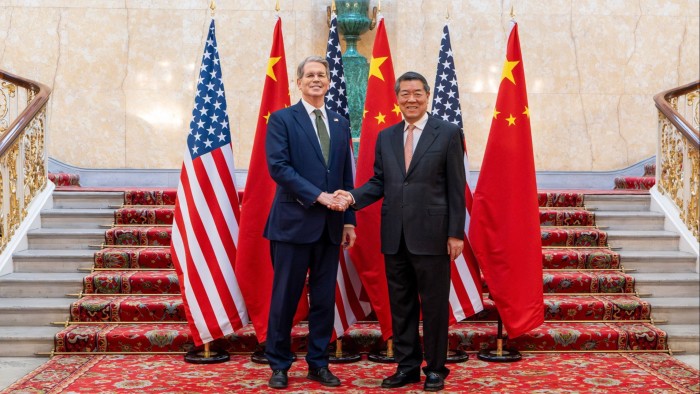Unlock the Editor’s Digest for free
Roula Khalaf, Editor of the FT, selects her favourite stories in this weekly newsletter.
The US said talks with China were “going well” as the two sides resumed efforts in London to end a trade war between the world’s largest economies.
The delegations arrived at Lancaster House, a UK government building in the centre of the city, just after 10.30am, on Tuesday with US commerce secretary Howard Lutnick saying the discussions would go deep into the day.
“We’ve been [talking] all day yesterday and we expect to go all day today. The talks are going well, we’re spending lots of time together,” he told reporters.
The talks between Chinese vice-premier He Lifeng and US officials, including Treasury secretary Scott Bessent, followed a call last week between US President Donald Trump and China’s President Xi Jinping.
The meeting marked the first face-to-face talks between He and Bessent since a 90-day truce brokered on May 12 in Geneva, when they agreed to slash their nations’ respective tariffs on the other by 115 percentage points.
The high-stakes negotiations are an effort to ensure that two contentious issues — Chinese exports of rare earths to the US and American technology export controls on China — do not derail the broader trade talks.
Ahead of the first round of negotiations in Geneva, Bessent warned that the high level of tariffs each side had imposed on the other amounted to an embargo on bilateral trade. Underscoring the risks, Chinese exports to the US fell more steeply in May, year on year, than at any point since the pandemic in 2020.
While the US has accused China of not honouring its pledge from Geneva to ease restrictions on rare earths exports, Beijing has increased pressure on Washington to eliminate technology-related export controls. It was also angry that the US announced new restrictions after the Geneva meeting.
The US has accused China of foot-dragging over approvals of shipments of rare earths, which are critical to the defence, car and tech industries. The slow pace of approvals has affected manufacturing supply chains in the US and Europe.
Beijing has in turn accused Washington of “seriously violating” the Geneva agreement by issuing new warnings on using Huawei chips globally, halting sales of chip design software to Chinese companies and cancelling visas for students from the country.
On Monday, a senior White House official indicated that Trump could ease restrictions on selling chips to China if Beijing agreed to speed up the export of rare earths.
That would amount to a significant change of policy from the Biden administration, which implemented what it called a “small yard, high fence” approach designed to restrict Beijing’s ability to obtain US technology that could be used to help China’s military.
Read the full article here




